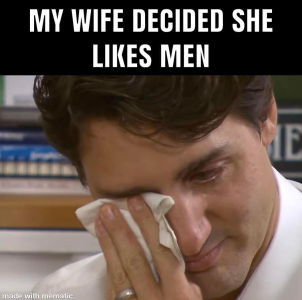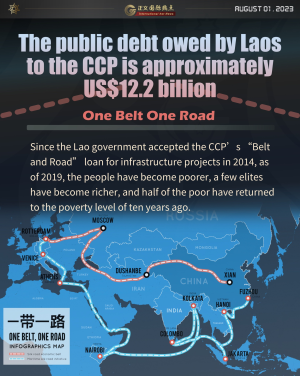Dang, maybe Gavin will just plunge his pecker in that big mouth…
You are using an out of date browser. It may not display this or other websites correctly.
You should upgrade or use an alternative browser.
You should upgrade or use an alternative browser.
Master Dance Your Cares Away/Fraggle/Law Abiding Citizens
- Thread starter Bryan74b
- Start date
Community megathread
He's mad because the "hammering" was somewhere other than his ass
False Flag confirmed.
The key question here was the response with the critters. If they are all gone, well that Easy

Jack Poso 🇺🇸 on GETTR : Jack Smith looks like the homeless guys all the other homeless guys beat up
Jack Smith looks like the homeless guys all the other homeless guys beat up

Democrats Clarify That No One Is Above The Law That They Selectively Enforce
WASHINGTON, D.C. — As news dropped that former President Donald Trump was facing a third federal indictment, Democrats were quick to explain that no American citizen is above the law they only selectively enforce.

Arrests of noncitizens with criminal convictions at border at record highs
Since January 2021, over 8 million illegal border crossers have entered the U.S.

Portland woman knocked out by attacker blames city for slow police response: ‘We did this to ourselves’
A Portland doctor knocked unconscious while walking in the city says her attack highlights ongoing problems with homelessness, public safety and police shortages.

Alaska task force estimates $67 million need to stave off food shortages
The dependence on outside sources makes the state vulnerable to shortages and food insecurity, according to the task force's report.
Oil Bulls On Edge Ahead Of Saudi Production Cut Extension | ZeroHedge
ZeroHedge - On a long enough timeline, the survival rate for everyone drops to zero

Illinois gov. aims for universal health care others say is a bad idea
In 2020, Illinois taxpayers began to subsidize the cost of undocumented immigrant health care for those over the age of 65.

Tulsi Gabbard on GETTR : Newest Trump indictment is Biden Admin's latest tyrannical tactic to distract and drain resources from his main political adversary. So now anyone who criticizes how govt runs an election is a criminal? Dem elite are destroyi
Newest Trump indictment is Biden Admin's latest tyrannical tactic to distract and drain resources from his main political adversary. So now anyone who criticizes how govt runs an election is a criminal? Dem elite are destroying our democracy/country.
Only 2 reasons I can think of. For Newsome, He is doing it for when Biden is forced to quit his reelection bid so the left can have another lefty in the wings. For Desantis, his poll number keep dropping so he must get out there and show the american people that he is better than what his poll numbers are showing. He knows that it will give him major media exposure as it will be televisedWhy? WFC
Biden continues his pattern of using public money to fight his personal battles.Fitch downgraded the US dollar
View attachment 191612
can you say "Blackmail"???
View attachment 191613
Then calls himself a public servant…
Mexico, hhhmmm, let's send all illegals back so Mexico can take care of them
Last edited:
Hahaha faggots gonna faggot 
Meanwhile it dipped a bit over the past couple days.
Bank of England releases new paper on Ripple use cases
The Bank of England (BoE) has released a new paper that explores the use of Ripple’s Interledger Protocol for synchronized settlement of paymentscrypto.news

Charlie Kirk on GETTR : The Trump case has been assigned to U.S. District Judge Tanya S. Chutkin, who is described by AP News as the toughest punisher of J6 cases, placing all defendants in all cases behind bars. Seems about par for the course whe
The Trump case has been assigned to U.S. District Judge Tanya S. Chutkin, who is described by AP News as the toughest punisher of J6 cases, placing all defendants in all cases behind bars. Seems about par for the course when it comes to justice in DC.


Luxury Texas Suit Maker Dresses Veterans at No Charge: ‘More Blessed To Give Than Receive’
This is awesome!


Exclusive — Trump on Romney: ‘A Loser,’ ‘Right Candidate Will Beat Him'
Former President Donald Trump, the leading 2024 GOP presidential candidate, told Breitbart News that former Massachusetts Gov. Mitt Romney is a “loser.”
www.breitbart.com

Bud Light Sales Collapse Hits Beer Maker's Earnings
Anheuser-Busch InBev reported a big drop in profit for the second quarter, coming on the back of poor Bud Light sales and the backlash over a shared campaign with transgender influencer Dylan Mulvaney.
www.breitbart.com

Exclusive -- Jim Jordan: McCarthy Willing to Open Biden Impeachment Inquiry
Kevin McCarthy is willing to open an impeachment inquiry into President Joe Biden if "necessary," Jim Jordan told Breitbart News.
www.breitbart.com


Residents of L.A.'s Watts Urged to Avoid Large Gatherings Due to Shootings
Residents of Watts are being told to avoid large gatherings, 3 years after Demcorats promised "defund the police" would not boost crime.
www.breitbart.com


Minnesota No Longer Reports Number of Infants Born Alive in Abortions
A law in Minnesota changed abortion reporting laws by no longer requiring abortionists to report when a baby is born alive in an abortion.
www.breitbart.com

Legal Activists Sue California School District for Banning Critical Race Theory
Two law firms are suing the school district in Temecula, California, in Riverside County, over a ban on Critical Race Theory (CRT).
www.breitbart.com

Anti-Oil Activists Climb PM Rishi Sunak's Country Home
Protesters scaled PM Sunak's historic country home, draping it black in a protest against the government allowing new oil drilling this week.
www.breitbart.com

Dimon: Green Spending in 'Inflation Reduction Act' Will Crowd out Other Investment
On Wednesday's broadcast of CNBC's "Power Lunch," JPMorgan Chase Chairman and CEO Jamie Dimon stated that there's a "good chance" spending on the green | Clips
www.breitbart.com
They can “add” as many members as they want. It wouldn’t change shit.

Breakingviews - The BRICS are better off disbanding than expanding
The BRICS are an acronym searching for a geopolitical role. When Brazil, Russia, India, China and South Africa get together for their annual summit in Johannesburg next month, a top issue for discussion will be whether to expand the club. Emerging economies might be better off if it disbands.
Despite their annual gatherings, the BRICS haven’t achieved anything notable together. They created a multilateral lender, the New Development Bank, in 2015. But it has approved only $33 billion of projects in its entire history. The World Bank, by contrast, committed $104 billion in its 2022 fiscal year alone.
The fault line between India and China, which fought a small war in the Himalayas in 2020, is one reason the BRICS club has done so little. India sees the People’s Republic as its most dangerous threat.
It is also hard to view China, now the world’s second-largest economy, as a voice for the Global South. Besides, most developing countries don’t want to be forced to choose sides in a showdown with the United States.
Russia’s invasion of Ukraine has further compromised the BRICS. Indeed, Vladimir Putin is not attending this year’s summit because South Africa would be required to arrest him, as it is a member of the International Criminal Court which has issued a warrant against the Russian President.
China is keen to expand the club to new members. But it’s not obvious what a bigger group would do. Given how hard it has been for even five nations to agree, it’s fanciful to suppose a larger and more disparate gathering would achieve anything more than complain about American hegemony.
Take currencies. It’s true that many developing countries want to wean themselves off their dependence on the U.S. dollar. The vagaries of Federal Reserve monetary policy whipsaw their economies. They would also like an alternative place to stash foreign exchange assets after the world’s rich democracies froze Russia’s reserves following the invasion of Ukraine.
But neither China nor India has a fully convertible currency - limiting the attractiveness of the yuan and the rupee. What’s more, New Delhi doesn’t want to be sucked into China’s currency orbit. It has been trying to stop oil importers paying for Russian oil with yuan, albeit with limited success.
Last edited:
Fitch is a joke but the slightly increased costs aren’t going to poll well for Republicans since they created the debt ceiling “crisis” and were responsible for J6 which was the other factor that was mentioned.
Similar threads
- Replies
- 13
- Views
- 622
- Replies
- 6
- Views
- 372
- Replies
- 34
- Views
- 1K
- Replies
- 56
- Views
- 5K
- Replies
- 113
- Views
- 10K







